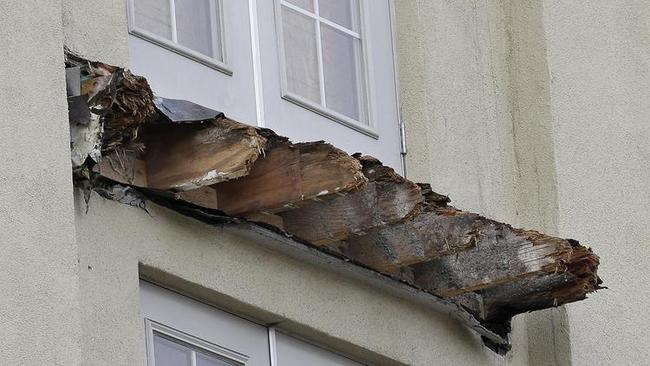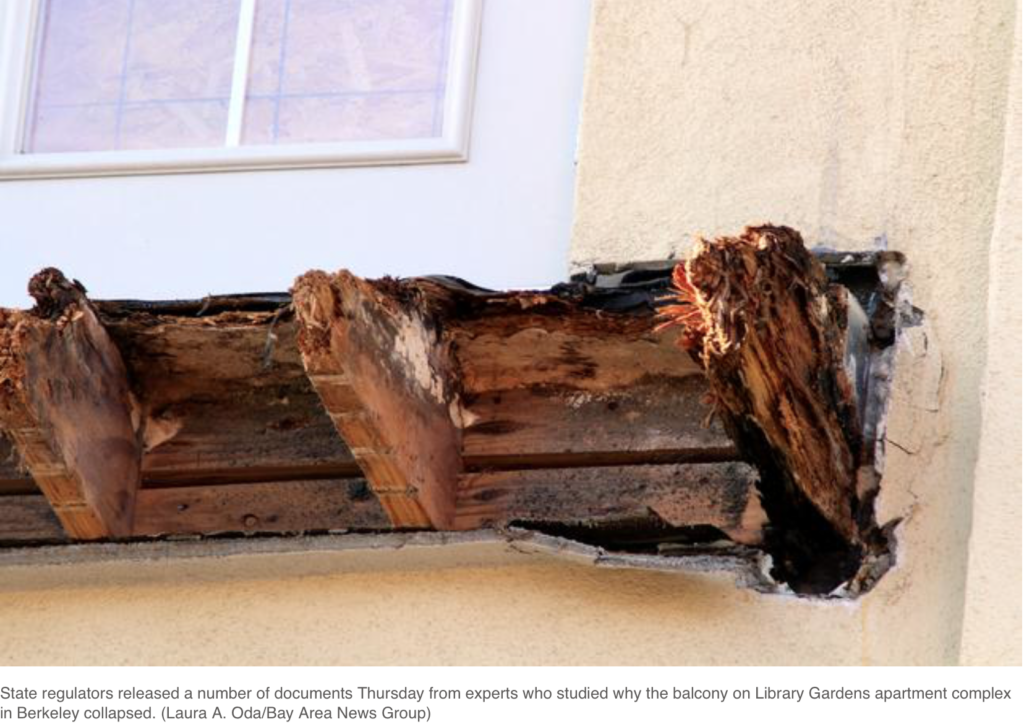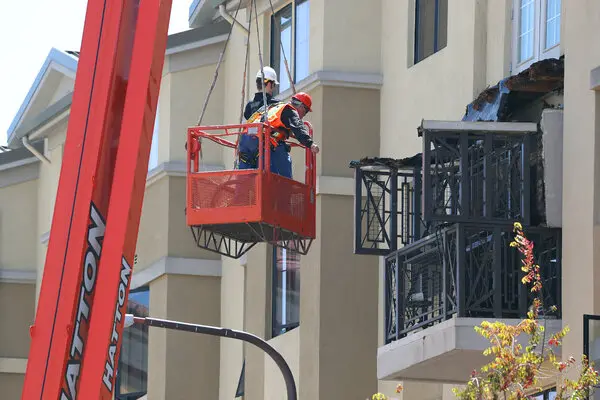Berkeley Tragedy Leads to New Inspection Law
On June 16, 2015, a fifth-story exterior balcony collapsed at a popular apartment building named Library Gardens near the University of California, Berkeley. At the time of the incident, a group of Irish exchange students were gathering on the balcony celebrating a 21st birthday party. Unfortunately, six students perished as a direct result of the collapsed balcony and seven others were severely injured (many of these people were cousins from one family). After an extensive investigation it was determined that the cause of the collapse was defective construction, and defective building materials. The construction method allowed moisture to enter the balcony joists inside the building cavity, causing dry rot and eventually failed structural members. The California Contractor’s State Licensing Board revoked the license of the company that installed the balcony. Diligent inspection and follow through by a competent property management team could have prevented this tragedy.

There were reports that evidence of dry rot had been observed on the balcony before this incident. Several lawsuits were filed and alleged that the building contractor Segue Construction used inferior composite wood in lieu of more robust pressure-treated structural members to construct the balcony. It was also alleged that one of the subcontractors allowed moisture to accumulate and saturate those failed structural composite members prior to closing up that balcony – thus encapsulating wet-wood members. It was also observed that mushrooms began to grow on the outside of that failed balcony as well as the fourth-floor balcony. Even though this information was brought to the property manager’s and building owner’s attention they elected to do nothing about it. A 145-page report prepared by the Contractor’s State Licensing Board details the precise issues, defects, and negligence that led to this catastrophe.
Owners and Property Managers are Now Required to Perform Periodic Inspections of California Balconies and Raised Decks
In response to this tragedy, the California legislature passed SB 721 to impose additional inspection requirements on owners of buildings containing “exterior elevated elements,” such as raised decks or balconies. Building owners must obtain an inspection of the exterior elevated elements and associated waterproofing elements. These inspections are now required to be performed by a licensed architect, licensed civil or structural engineer, a building contractor holding specified licenses, or an individual certified as a building inspector or building official. The inspector must present its report to the owner of the building within 45 days of the completion of the inspection, and the owner must maintain copies of the report for 2 inspection cycles. Each inspection cycle is six years. A condominium conversion owner must obtain an inspection before the close of escrow.

If the inspection reveals conditions that pose an immediate hazard to the safety of the occupant, the inspection report must be delivered to the owner of the building with 15 day and emergency repaired be undertaken. Importantly, notice must be given to the local enforcement agency, or authority have jurisdiction. If repairs are not completed on time, the local enforcement agency or authority having jurisdiction my send a 30-day corrective notice to the owner of the building and assess civil penalties and liens against the property.

Contact Esquire Property Management Group if You Have Questions or Concerns About this New Law
If you are a building owner with a raised deck or balcony you are now required to follow this new inspection law. Forward this article to your property management company so they are aware of these new requirements. If you manage your building yourself and would like additional information about this new requirement please don’t hesitate to reach out to David Roberson, Esq. at Esquire Property Management Group or give me a call at 1-408-838-5113.
David currently is the broker/owner of several real estate related businesses which manage and maintain 300+ client properties on the San Francisco Peninsula.
Trust, transparency, and performance guarantees are the foundation of these businesses. David challenges anyone to find a PM professional that offers services similar - extensive education, customer service, and performance guarantees.
David also provides consulting for his clients on property development feasibility, construction, and complex real estate transactions.
David has authored a published law review article, three real estate books, and over 150+ real estate blog articles.
- “Wildfires, Insurance & Mortgages: Will Your Home Survive the Financial Aftermath?” - March 3, 2025
- What’s Driving California’s Commercial Real Estate Shakeup? - February 27, 2025
- Critical Issues in Triple Net Leases Investors Should Know - February 14, 2025

